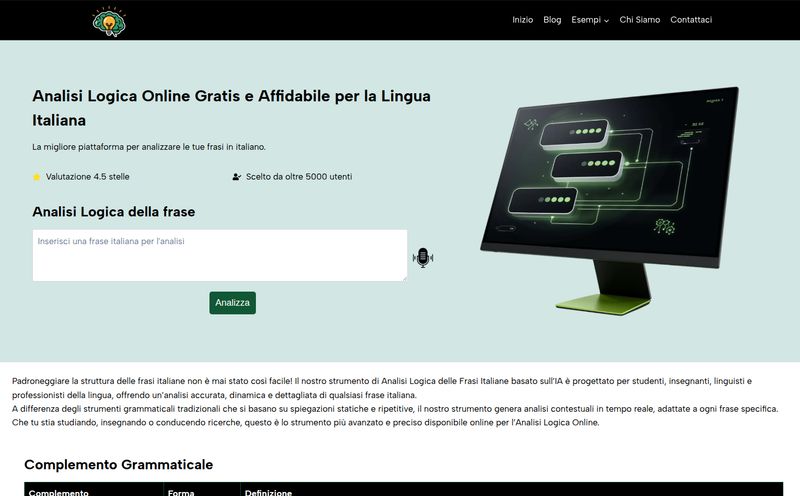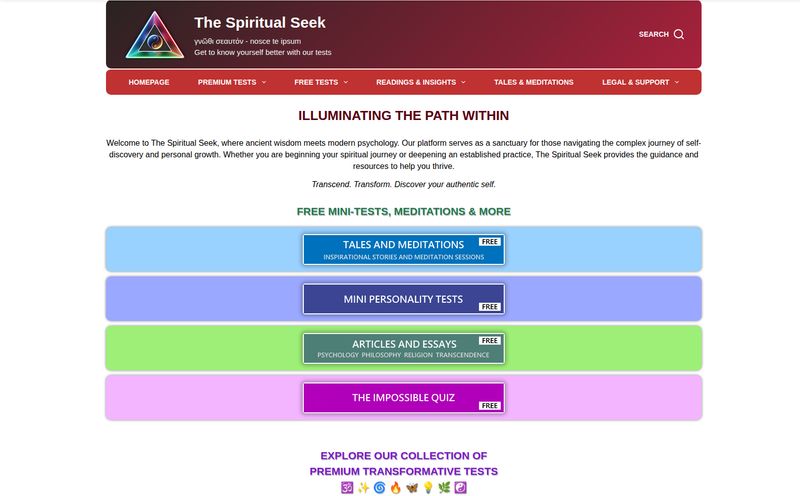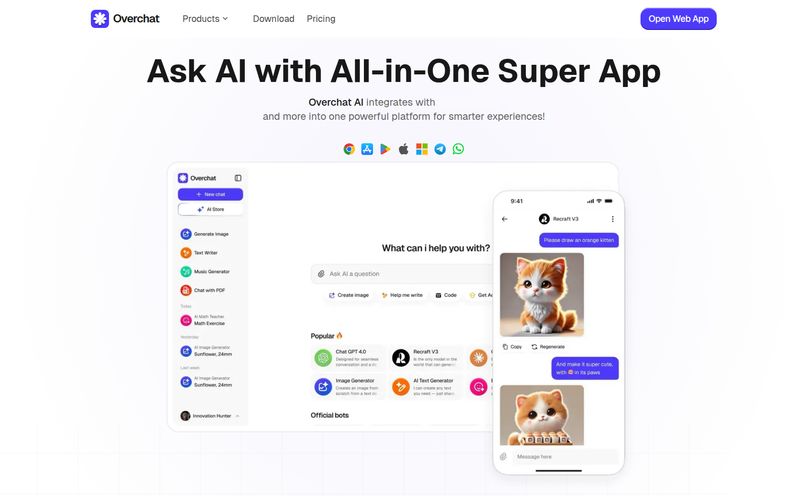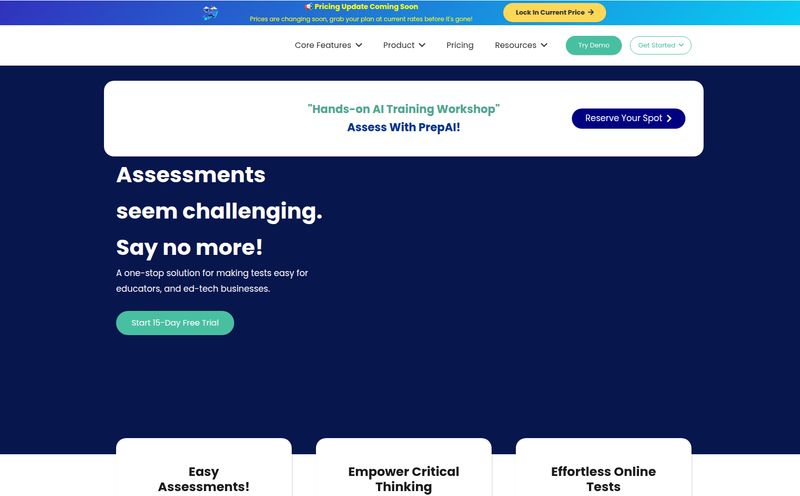We've all been there. You’re trying to level up your English, maybe for a new job, to finally read that book in its original form, or just to sound smarter on your conference calls. So you download the flashcard apps. You make the lists. You promise yourself you’ll study 20 new words a day. And for a week, you're a champion. Then… life happens.
The flashcards gather digital dust. The lists get lost in a sea of notes. It’s what I call “flashcard fatigue,” and it's a killer of good intentions. For years, the SEO and content world has been buzzing about user intent and context. Why shouldn't language learning follow the same principle? Learning a word in a vacuum is one thing; seeing it live, in the wild, on a website you actually wanted to read? That’s something else entirely. It sticks.
That’s the exact itch a neat little tool called Elia promises to scratch. I've been playing around with it for a while now, and I’ve got some thoughts. Is it the magic bullet for vocabulary growth? Let's see.
What Exactly is Elia? A Vocabulary Coach in Your Browser
So, what is Elia? At its core, Elia is a Chrome extension. But that’s like calling a Swiss Army knife just a knife. It’s a tool designed to weave vocabulary learning directly into your daily web browsing. No more setting aside dedicated, and often tedious, study time. Instead, you learn while you're doing what you already do: reading articles, scrolling through blogs, or researching for work.
Think of it as a personal language coach who sits on your shoulder, whispering translations and definitions in your ear, but only when you need them. It's built for those intermediate-to-advanced English learners who are already consuming a fair bit of English content but want to polish their language and pick up more sophisticated expressions. It’s a tool for the busy, the efficient, and frankly, those of us who are a bit lazy about traditional study methods.
My Experience Getting Started with Elia
The landing page boasts you can “Try it out in 3 minutes,” and honestly, they’re not exaggerating. The process is dead simple:
- You need Google Chrome. (Yeah, we'll get to that later).
- You pop over to the Chrome Store and click 'Add to Chrome'.
- Create a quick account so it can save your progress.
That’s it. You open an English website, find a word that makes you go “huh?”, and you’re off. The first time I highlighted a word—I think it was “ephemeral” on a tech blog—a small, clean pop-up appeared with the definition and a translation. No new tabs, no jarring interruptions. It was... surprisingly smooth.
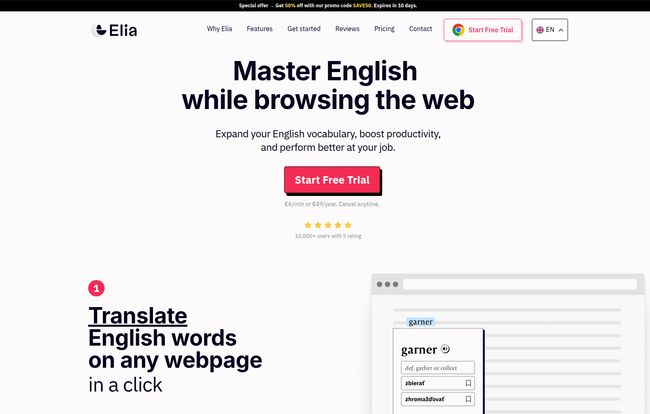
Visit Elia
The Core Features That Make Elia Stand Out
Plenty of tools can look up a word. The magic of Elia is in how it strings its features together to create a learning loop.
Instant Translations and Word Lookups
This is the bread and butter. You double-click or highlight any word on a webpage, and Elia gives you a simple, concise definition. It also offers translations in over 50 languages, which is a massive help for understanding the true nuance of a word in your native tongue. It's fast, and it keeps you in the flow of what you're reading. That's a huge win for maintaining focus and generating traffic to the content you actually want to read.
The Smart Wordlist and Practice System
Here’s where it gets clever. When you look up a word, you can save it to your personal “Wordlist” with a single click. This isn’t just a static list. Elia then starts working for you in the background. As you browse other sites, it will automatically highlight words from your list, giving you these little “Hey, remember me?” moments. It's spaced repetition without the spreadsheet.
Seeing a word you learned yesterday pop up in a new article today is an incredible feeling. It’s like your brain is building connections on its own. You can then go to your dashboard and take practice quizzes on your saved words to really cement them in your memory. It turns the entire internet into your practice ground.
Personalized Word Recommendations
This is Elia’s proactive feature. It doesn’t just wait for you to find words. Based on the content you read and the words you save, it starts highlighting new words it thinks you should learn. At first, I was skeptical. I thought it would be annoying. But it’s surprisingly well-calibrated. It feels less like an intrusion and more like a helpful guide pointing out interesting landmarks you might have missed. For someone in SEO, it feels a bit like a semantic keyword suggestion tool, but for your own brain.
The New PDF Integration
This is a big one, especially for academics, students, or anyone in a corporate setting who lives in a world of PDF reports. With the paid plans, Elia works inside PDFs opened in Chrome. Suddenly, those dense, jargon-filled documents become interactive learning materials. A very smart addition.
The Good, The Bad, and The Browser-Specific
No tool is perfect, right? Elia is brilliant, but it's not without its quirks.
The best part, for me, is the sheer convenience. It has genuinely changed how I view my reading time. I'm absorbing new vocabulary without even trying. The learning is so integrated, so contextual, that it almost feels like cheating. The design is clean, unintrusive, and just… works. It’s a fantastic example of a tool that decreases friction instead of adding it.
Now, for the flip side. The biggest hurdle is its exclusivity. It's a Chrome-only extension. As someone who occasionally flirts with Firefox and Safari, this is a bit of a bummer. One of the user testimonials even says it “forced me into switching from Safari to Chrome.” That’s a powerful statement, but also a significant limitation. If you’re not a Chrome user, Elia is, for now, a non-starter.
The free plan is also quite limited. You get a taste—unlimited lookups are generous—but with only 10 words in your wordlist and 10 recommendations, you hit the ceiling pretty fast. Its a great trial, but to get the real, compounding benefit of the tool, you'll need to open your wallet. Which brings us to…
Let's Talk Money: Elia Pricing Explained
Elia operates on a freemium model. The pricing is pretty straightforward, and I appreciate that they offer monthly, yearly, and lifetime options. Let’s break it down.
| Plan | Price | Key Features |
|---|---|---|
| Free | €0 | Unlimited Lookups, 10 Word Recommendations, 10 Word Practice, 10 Words in Wordlist. |
| Monthly | €5.99 / month | Unlimited everything, PDF Integration, Daily Goal Progress. |
| Yearly | €49 / year (saves ~30%) | Unlimited everything, PDF Integration, Daily Goal Progress. |
| Lifetime | €249 one-time | Unlimited everything forever. The “buy it once, cry once” option. |
Note: Prices are based on the information available at the time of writing and might change. Always check the official pricing page for the latest details.
In my opinion, the value proposition is pretty clear. The monthly plan is great for a test drive beyond the free version. But if you're serious about this method of learning, the Yearly plan offers a substantial discount. The Lifetime plan is for the true believer—someone who sees this as a long-term part of their learning toolkit. Considering the cost of language tutors or other premium courses, it feels reasonably priced.
Who Should Actually Use Elia?
So, is Elia for you? It's a fantastic tool, but for a specific person. You're the ideal Elia user if:
- You're an intermediate to advanced English learner (B1 to C2 level).
- You already spend a lot of time reading in English on your computer.
- You're a loyal Google Chrome user.
- You prefer organic, contextual learning over structured, rote memorization.
- You're a busy professional, student, or lifelong learner looking for an efficient way to improve.
Who is it not for? If you're an absolute beginner, you'll probably benefit more from a foundational course that teaches grammar and sentence structure from the ground up. If you do most of your reading on a phone or tablet, or if you're married to a browser other than Chrome, you’ll have to wait and see if they expand.
My Final Verdict on Elia
After spending some quality time with Elia, I'm genuinely impressed. It’s not just another dictionary tool. It’s a thoughtful, well-designed system that cleverly transforms a passive activity into an active learning experience. It solves the “flashcard fatigue” problem by bringing the classroom to the content, not the other way around.
While the Chrome-only limitation is a significant one, it’s a tool that knows its audience and serves them exceptionally well. It won't replace the need for speaking practice or grammar study, but for targeted vocabulary acquisition, it's one of the most seamless and effective tools I've come across. It turns the whole web into your personal textbook. And that, in my book, is a pretty brilliant way to learn.
Frequently Asked Questions about Elia
- Is Elia safe to use?
- Yes. According to their site, Elia is GDPR compliant and all user data is encrypted. As an SEO professional who deals with site security, this is something I always look for, and it’s good to see them prioritize it.
- Can I use Elia on my phone or a browser other than Chrome?
- Currently, no. Elia is exclusively a desktop Chrome extension. This is probably its biggest limitation for now.
- How is Elia different from just using Google Translate?
- Google Translate is a reactive tool; you give it something to translate. Elia is proactive. It not only translates but also saves words, creates practice quizzes, highlights your saved words across the web for reinforcement, and even suggests new words for you to learn. It’s a complete learning system, not just a translator.
- Does Elia work on any website?
- It works on virtually any English website you can open in the Chrome browser. With a paid subscription, it also works on PDF files that you open in Chrome, which is a fantastic feature for students and professionals.
- Is the free plan good enough to learn with?
- The free plan is an excellent way to see if Elia’s method works for you. You get unlimited lookups, which is great. However, with the cap on saved words and recommendations, you'll likely want to upgrade to a paid plan to experience the full, long-term benefits of the learning loop.
